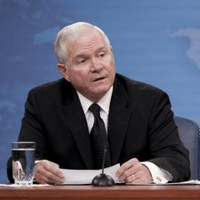Robert Gates could boast a remarkable public service career when he retired from the Pentagon on July 1. In addition to his other contributions, Gates was the only defense secretary to have overseen two different wars serving under two presidents of two different parties. His solid if low-key Republican credentials and reputation as a prudent hawk helped depoliticize national security issues during and well beyond the presidential transition from George W. Bush to Barack Obama. These qualities also helped Obama avoid the kinds of problems experienced by President Bill Clinton, the previous Democratic president whose clashes with senior military officers over policies and values alarmed observers (.pdf) of post-Cold War U.S. civil-military relations.
When Gates became secretary of defense on Dec. 18, 2006, it was understood that his priority was salvaging the precarious U.S. security situation in Iraq. At the time, a vicious sectarian civil war there was inducing Washington's military allies as well as international humanitarian organizations to depart from the country en masse. Gates arrived after Bush had already decided to surge additional U.S. combat troops into Iraq and to appoint Gen. David Petraeus to command the new counterinsurgency campaign there. Nonetheless, Gates played a major supporting role in the subsequent U.S. recovery through several key supporting decisions. For example, he increased the overall size of the U.S. Army by 65,000 personnel and the Marine Corps by 27,000 soldiers. Gates also lengthened combat tours in Iraq to 15 months, allowing troops more time to acquire and then apply their new combat experience. In partial compensation, Gates ended the hated stop-loss orders that had kept American soldiers on active duty against their will.
Perhaps Gates' most important contribution was to add enough time to the political clock in Washington to give U.S. forces adequate time to defeat the insurgents. When casualties soared during the Surge -- an expected immediate outcome given the more active American military role in Iraq -- Gates resisted premature calls in Congress to change course. Since 2007, the level of violence in Iraq has sharply declined, along with the number of U.S. soldiers, and the Pentagon is now transferring the lead role there to the State Department.

